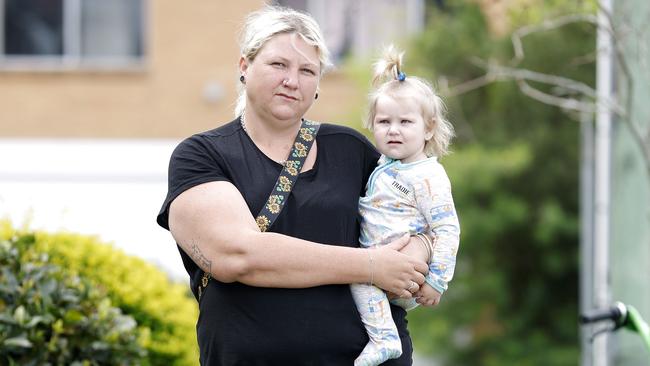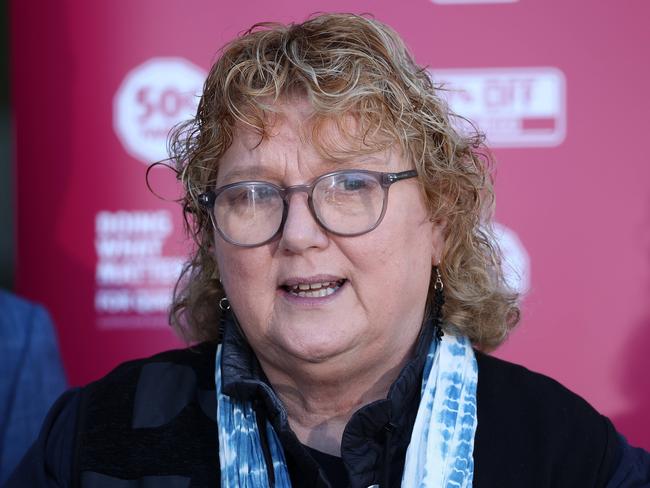Qld homeless numbers triple in 18 months
A mother-of-nine has highlighted a major crisis across Queensland, revealing she has had to move house about 10 times in a year.

QLD Politics
Don't miss out on the headlines from QLD Politics. Followed categories will be added to My News.
The number of families experiencing homelessness in Brisbane has almost tripled in the past 18 months, leading housing advocates to demand the state government free up more publicly owned land to increase housing supply.
Micah Projects supported 61 families in January 2023, but this month has provided services to 174 families in need already.
It follows a peak of 196 families in July.
The city’s housing crisis is so severe that organisations such as Micah Projects have flown in help from New York City, where chronic housing problems have led to 100,000 people homeless.
US-based Community Solutions CEO Rosanne Haggerty said Brisbane’s homelessness situation had all the hallmarks of the US’s housing crisis.
She said it was largely soaring construction costs which had helped create a homeless population of more than 100,000 in New York City.
In Brisbane, nearly 2400 people were homeless at some stage during the 2023-24 financial year.
“What we learned over the years is that you have to really organise the system to see that it is performing for people who are at risk of homelessness or stuck in homelessness,” Ms Haggerty said.
“So what that means is we facilitate all the key agencies, not-for-profits, and government agencies in any community, to pursue a single goal, which is the measurable reductions in homelessness.”

Micah Projects chief executive Karyn Walsh said there needed to be a plan to reduce dependency on public housing wait lists and motel stays.
“We have to focus on the government owned land, not just church land which is being talked about, because that’s not going to be suitable for a whole range of people … government needs to invest in what they’ve got, and they’ve got the land.”
“It’s always going to cost more, but it’s going to cost more if you don’t do it … you’re going to be just wasting it on motels for 40 years, we’ve got a problem with motels now, imagine what it’s going to be like closer to the Olympics, and motels aren’t the answer.”
Abagail Sleaman was booted from her long-term rental in Dalby last year after it was bought by developers. Since then she has been in temporary housing with her eight children.
“So just in the last year, we have moved nine times, 10 times,” Ms Sleaman said.
“I’ve been trying with real estate since, because I haven’t got bad credit or anything and I just keep getting put down because I’ve got too many kids.”
With another child on the way, Ms Sleaman reached out to Micah Projects for support, where she is currently staying in two-bedroom temporary housing with a shared kitchen and living space.
“It just makes me feel like I’m failing the kids … I’ve never, ever in my life thought that I’d be in this situation,” she said.
It comes as fresh data from mobile laundry charity Orange Sky revealed one in five Queenslanders report a personal experience with homelessness in their lifetime, with housing supply topping the list of key contributors to becoming homeless.
The non-for-profit organisation which started out of a Brisbane Garage by co-founders Nic Marchesi OAM and Lucas Patchett OAM, and has now been running for a decade, has first hand witnessed the boom of homelessness in the state.
“Orange Sky has never been busier and I think that’s a reflection of there’s never been a time that Orange Sky has helped as many people as we’re doing now,” Mr Patchett said.
“We talk about homelessness can happen to anyone, but that reality has almost become more stark in the last few years.”
The pair said there are many misconceptions around homelessness with 34 per cent of Queenslanders believing substance abuse or addiction is the primary contributor to homelessness and 28 per cent believing mental illness – when in actuality it’s the lack of affordable housing.
“The housing crisis has become the lead, after that is then financial difficulties and family and domestic violence. So there’s a number of reasons ahead of those more stereotyped reasons that people see and experience,” Mr Patchett said.
Having rapidly expanded over the last decade due to growing demand for services, the charity has provided 436,000 loads of washing and 40,000 warm showers to those doing it tough and Mr Marchesi said Orange Sky was not going anywhere, anytime soon.
“There’s a lot more communities that Orange Sky can still show up and play a role in, and we can really adapt to that changing face of homelessness or now beyond homelessness and actually around hardship,” he said.





